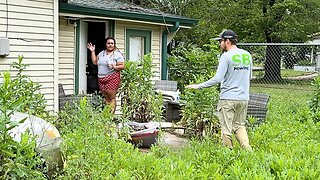Premium Only Content

Venezolana Singing in the street in Barranquilla Colombia
Venezuela's ongoing political and economic crisis has left many of its citizens in dire straits, struggling to access basic necessities like food, medicine, and employment. This has led to a mass exodus of Venezuelans fleeing their country in search of a better life elsewhere. One of the neighboring countries that has received a large influx of Venezuelan migrants is Colombia, where many women have come seeking work opportunities to support themselves and their families.
The situation in Venezuela has been particularly difficult for women, who have been disproportionately affected by the country's economic collapse. With food and medicine shortages, skyrocketing inflation, and a crumbling healthcare system, women have been forced to take on additional responsibilities to keep their families afloat. Many have become the sole breadwinners for their households, taking on low-paying jobs in the informal economy or engaging in cross-border trade to buy and sell goods.
However, as conditions in Venezuela have continued to deteriorate, many women have found it increasingly difficult to make ends meet. The lack of job opportunities and the hyperinflation of the Venezuelan bolivar have made it almost impossible to earn a living wage. As a result, many women have been forced to leave their homes and families behind to seek work in neighboring countries like Colombia.
For Venezuelan women, finding work in Colombia can be a daunting task. Many arrive in the country with little more than the clothes on their backs, and without formal work permits or documentation, they are often forced to take on low-paying jobs in the informal sector. This can include anything from domestic work to street vending, cleaning, and manual labor. While these jobs provide some income, they often offer little job security, no benefits, and few protections against exploitation.
Despite these challenges, many Venezuelan women have found a way to make a living in Colombia. Some have turned to entrepreneurship, starting their own small businesses selling food, clothing, or other goods. Others have found work in the service sector, working in restaurants, hotels, or retail shops. And still others have found employment in industries like construction or agriculture, where labor demand is high.
For many Venezuelan women, the decision to leave their homes and families behind to seek work in another country is a difficult one. The journey can be dangerous and fraught with uncertainty, and the challenges of adapting to a new culture and language can be overwhelming. However, for those who are able to find work and support themselves and their families, the rewards can be great.
One of the challenges that Venezuelan women face in Colombia is discrimination and xenophobia. While many Colombians have been welcoming to Venezuelan migrants, others have been less hospitable, viewing them as a drain on resources or as competition for scarce jobs. This has led to incidents of violence and harassment, particularly against women.
To address this issue, organizations in Colombia and abroad have launched initiatives to provide support and resources to Venezuelan migrant women. These include programs to help women access job training, education, and legal assistance, as well as initiatives to raise awareness about the challenges facing Venezuelan migrants and to combat discrimination and violence.
Despite the challenges that Venezuelan women face in Colombia, many remain hopeful for the future. Some have been able to reunite with family members who have also fled Venezuela, and others have found a sense of community and support among other Venezuelan migrants. And while the situation in Venezuela remains dire, many women hold out hope that one day they will be able to return home and rebuild their lives in their own country.
In conclusion, the influx of Venezuelan women seeking work in Colombia is a reflection of the dire economic and political situation in their home country. While many have been able to find work and support themselves and their families, they face significant challenges and obstacles along the way.
-
 46:18
46:18
SB Mowing
2 days agoShe was LOSING HOPE but this SURPRISE CHANGED EVERYTHING
3.41K25 -
 LIVE
LIVE
ItsLancOfficial
3 hours agoWE LIVE 🔴WE LIVE 🔴 SUNDAY SUNDAYS!!!!!!! TARKOV
308 watching -
 LIVE
LIVE
EricJohnPizzaArtist
6 days agoAwesome Sauce PIZZA ART LIVE Ep. #59: Are You Ready for some FOOTBALL with GameOn!
96 watching -
 1:21:43
1:21:43
Jake Shields' Fight Back Podcast
9 hours agoJake Shields and Paul Miller!
24.7K59 -
 LIVE
LIVE
TRAGIKxGHOST
38 minutes agoTrying to get SCARED tonight! | Are You SCARED!? | Screams Beyond Midnight | Grab a Snack
46 watching -
 LIVE
LIVE
StuffCentral
2 hours agoI'm baaack (no you can't play with me.. unless you a healer)
43 watching -
 2:25:11
2:25:11
TheSaltyCracker
3 hours agoTrump Is Not Dead ReEEeStream 8-31-25
49.2K82 -
 LIVE
LIVE
THOUGHTCAST With Jeff D.
1 hour agoLabor Day Weekend FORTNITE With THOUGHTCAST Jeff & the squad
82 watching -
 3:44:05
3:44:05
Rallied
4 hours ago $2.24 earnedSolo Challenges All Day
26.5K1 -
 LIVE
LIVE
iCheapshot
4 hours agoCall of Duty: Black Ops Campaign
37 watching